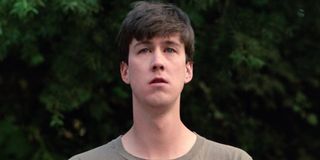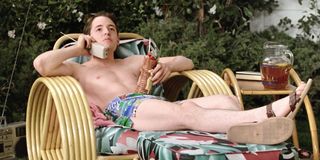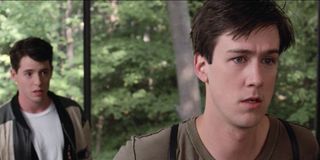Was Ferris Bueller's Day Off Really All Part Of Cameron's Imagination? Let's Discuss

John Hughes' Ferris Bueller's Day Off is one of those rare movies that everyone seems to enjoy. This timeless story about a high school senior who would do anything to skip school for a day and bop around the city of Chicago with his best friend and girlfriend is full of innocence and loads of good, clean fun. Well, it is until you consider the Fight Club Theory.
Never heard of the Fight Club Theory? You've seen Fight Club, right? If not, you're about to be majorly spoiled, so if you're still planning on watching it, maybe it's time to abandon this article.
Moving on... You know, David Fincher's adaptation of Chuck Palahniuk's debut novel about an anonymous narrator who has a chance encounter with the man he dreams of being only to find out this new and extremely dangerous friend was just a figment of his imagination? Well, just apply that theory to the plot of Ferris Bueller's Day Off, this time having Ferris be nothing more than a figment of Cameron's imagination.
Have I lost you yet? Don't worry, I'll attempt to make things clearer as we move along. But with that being said, first let us examine the plot of the movie as if everything that happened in the movie actually happened (yes, even the Von Steuben Day parade scene).

Ferris Bueller Really Got His Day Off
In case you haven't watched Ferris Bueller's Day Off in a while, here's how the movie goes down. On a perfectly normal day, high school senior Ferris Bueller (Matthew Broderick) masters the art of faking sick and convinces his parents to let him stay home from school. Not wanting to settle for just hanging around the house taking long showers, sitting in the backyard drinking tea, or showing some impressive computer skills, Ferris decides to rope in his girlfriend, Sloane Peterson (Mia Sara) and longtime best friend Cameron Frye (Alan Ruck) in the adventure of a lifetime, or at least one set in Chicago.
Thanks to some great movie magic, Ferris, Cameron, and Sloane are able to take in all the sights and sounds of a bustling Chicago including the Art Institute, the top of the Sears Tower (never calling it Willis Tower), the Chicago Mercantile Exchange, part of a game at Wrigley Field, the aforementioned parade, and even a quick lunch at Chez Quis before its all said and done. Once again, this is movie magic, how else do you think the gang of three could make it all over Chicago in the middle of a business day and still have enough time to get back to the suburbs before anyone was the wiser?
And that doesn't even factor in the amount of time Ferris spent getting ready before he and Cameron tricked Ed Rooney (Jeffrey Jones) into letting Sloane leave school to be with her "grieving" family. Or Cameron's meltdown after learning that his father's prized Ferrari 250 GT California Spyder was taken out for a joyride. Or the whole mad dash for Ferris to get back to his house before his parents came home from work. It's a John Hughes movie after all, far stranger and less explainable things have happened.
CINEMABLEND NEWSLETTER
Your Daily Blend of Entertainment News
This is the face value scenario. It all happened as it happened. Now let's explore the Fight Club Theory scenario, in which most of this was in Cameron's head...

Ferris Bueller's Day Off Was All In Cameron's Head
Here is where the fun begins. What if all of those unexplainable questions about Ferris Bueller's Day Off weren't chalked up to the "movie magic" argument and instead were all part of the imagination of Cameron Frye? That's where the Fight Club Theory comes into play. In a very detailed post on the idea on the Fan Theories Fandom page, there is a full explanation of the theory that the entire movie played out in Cameron's head and the Ferris Bueller is just the ideal version of the person the neurotic and borderline-suicidal high school senior wishes he could be. But there's some pretty convincing evidence to back it up.
The first aspect of the movie that this theory tackles is the problem of driving into Chicago from the suburbs, hit all the major attractions, and then get out of the city and back to the suburbs in no more than eight hours. The theory argues that Cameron is imagining the whole day-trip to the city as he lies in his bed trying to make sense of his life. You could also lump in the idea that all of the "Save Ferris" messages plastered throughout the city are nothing more than representations of Cameron's wish to have someone care about him like everyone seems to care about Ferris.
This theory also factors in the final act of the movie that includes Ferris running like hell (through backyards and all) after dropping off Sloane. If we're going with the idea the Ferris is the embodiment of everything Cameron wishes to be then it makes sense for the hero to have one final obstacle in front of him before he makes it back to safety. I guess this also means Cameron is a big fan of Joseph Campbell's The Hero With A Thousand Faces.
Another part of the theory suggests that Cameron's issues with his father are at the root of his fantasy and the creation of the Ferris Bueller character. Having such a miserable existence at home, Cameron simply creates the characters of Ferris and Sloane as a way to cope with the loneliness he feels after growing up the product of a loveless marriage. While probably not the greatest of ideas for an awkward and lonely high school senior, the creation of the friends serves as a coping mechanism for Cameron. But if this is correct, does that mean that the iconic "He'll keep calling me" scene didn't actually happen?
But then again, the Fight Club Theory is just that, a theory created to help explain some of the more unexplainable aspects of Ferris Bueller's Day Off. And although it's silly, a little far-fetched, and laughable at times, it does add another layer to one of the quintessential movies of the '80s. We'll never know for sure whether or not John Hughes intended for us to dive so deep in the psyche of one of his most iconic characters, but hell, it's a lot of fun to think about.
So, what do you think about this theory? Is it a little too much for you and takes the fun out a classic movie of your adolescence? I would really like to know where you all stand, so make sure to fill out the poll below and sound off in the comments.
This poll is no longer available.

Philip grew up in Louisiana (not New Orleans) before moving to St. Louis after graduating from Louisiana State University-Shreveport. When he's not writing about movies or television, Philip can be found being chased by his three kids, telling his dogs to stop barking at the mailman, or chatting about professional wrestling to his wife. Writing gigs with school newspapers, multiple daily newspapers, and other varied job experiences led him to this point where he actually gets to write about movies, shows, wrestling, and documentaries (which is a huge win in his eyes). If the stars properly align, he will talk about For Love Of The Game being the best baseball movie of all time.
Most Popular






